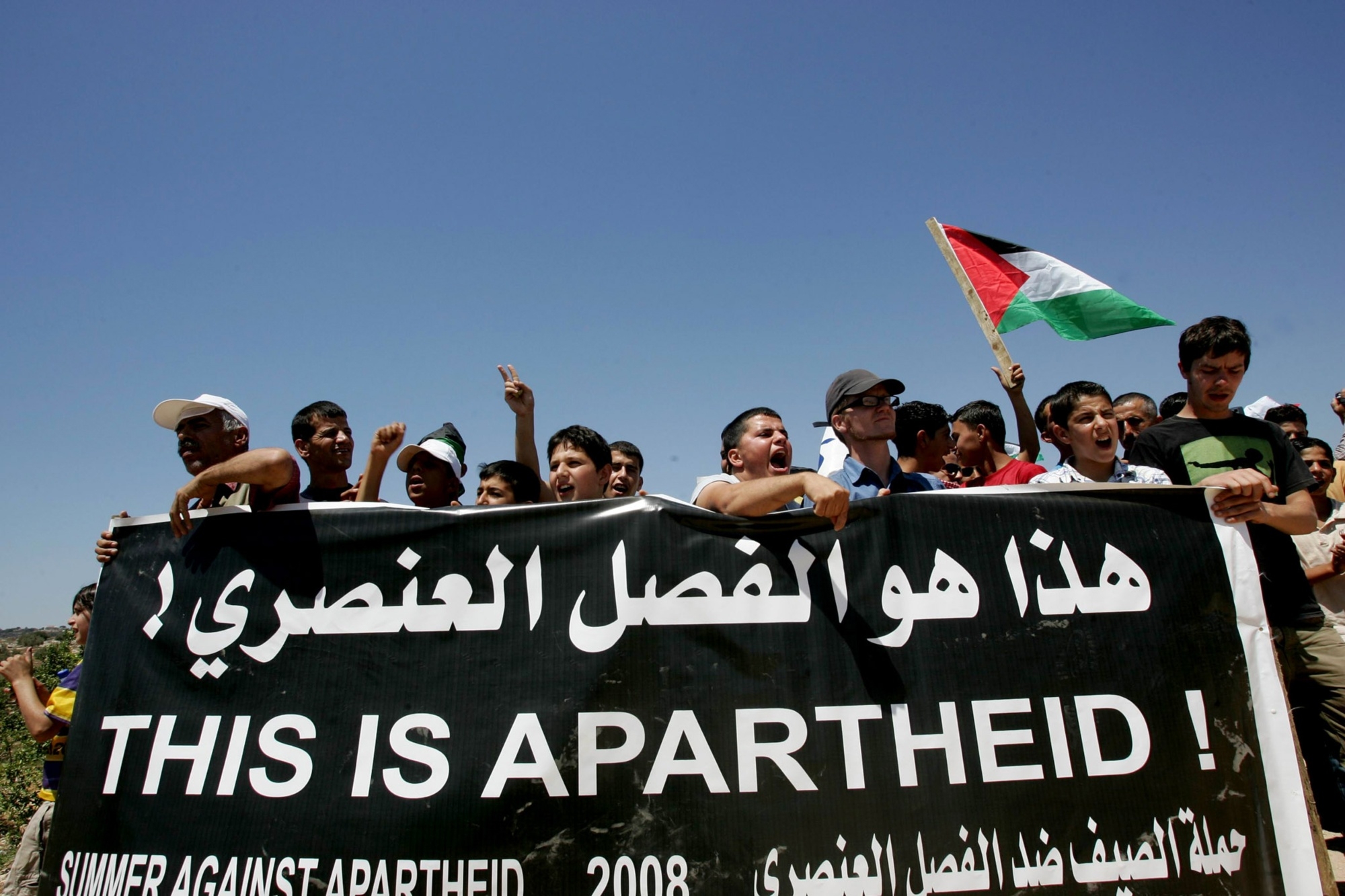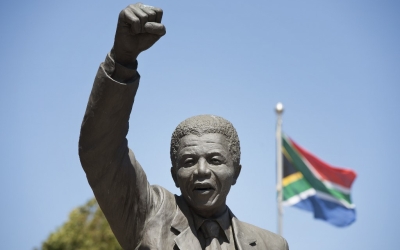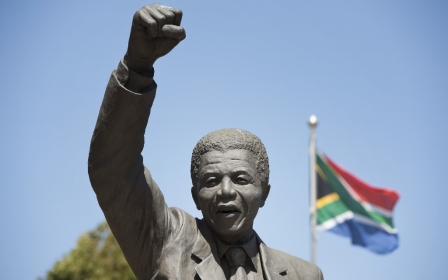With annexation plan looming, Israel grapples with reality of apartheid

On 15 June 1967, five days after the end of the Middle East war, the Israeli cabinet met for the second time since the ceasefire was announced.
Menachem Begin, the historical leader of the nationalistic Herut party - which would later become Likud - had joined the government only a few days before the war, having previously been treated as a pariah by the successive Zionist "social democrat" ruling parties in the first 19 years of Israel's existence.
New MEE newsletter: Jerusalem Dispatch
Sign up to get the latest insights and analysis on Israel-Palestine, alongside Turkey Unpacked and other MEE newsletters
Begin was enthusiastic about Israel’s territorial gains during the war, as it was now occupying the West Bank, the Gaza Strip, East Jerusalem, the Sinai Peninsula and the Golan Heights. He was adamant about maintaining Israeli control over lands west of the Jordan River.
"Regarding Western Eretz Israel (the land of Israel), we should not give back one millimetre," he said.
As for the "Arabs" - referring to Palestinians - living in these areas, Begin had a suggestion. For the first seven years they would be "residents, not citizens", and after this period of time, "we could humanely ask each one of them if he wishes to be a loyal citizen or to go to another country. Supposing that the majority would stay, that should not frighten us".
Fifty-three years later, this plan never came to pass, as millions of Palestinians continue to live under the rule of a military occupation.
But the impending annexation of parts of the West Bank on 1 July has disrupted the status quo and become a catalyst for debate in the Israeli political class that would have been unthinkable even a few months ago: whether Israel is an apartheid state.
Decades of right-wing policy
Ten years after what Begin referred to as the "liberation of Eretz Israel" in that 1967 cabinet meeting, he was elected prime minister. Yet neither he nor his Likud party over the span of the last 43 years ever tried to implement his vision to grant citizenship to Palestinians in the occupied territories, which would have - at least in theory - turned the whole of historic Palestine into a single, democratic state.
Instead, successive prime ministers from Likud - along with their allies from the nationalist and religious right - pushed forward and encouraged settlement expansion in the occupied territories in violation of international law, helping the settler population expand to more than 400,000 in 2018.
Yet all failed to present a political vision or programme for how they envisioned the final status of areas occupied since 1967. The settlements had above all a preventive role: to spread out across the West Bank, disconnecting Palestinian cities and villages from each other, in order to impede the "danger" of an independent and contiguous Palestinian state.
While successive centre-left leaders such as Shimon Peres, Yitzhak Rabin, Ehud Barak and even Ehud Olmert tried - or at least pretended - to look for a negotiated solution to the "Palestinian problem" as they would call it, the right-wing bloc was busy creating facts on the ground in order to make sure any such solution would fail.
After being reelected in 2009, Prime Minister Benjamin Netanyahu perfected this right-wing strategy.
On the one hand, he ignored the Palestinian leadership and brought the peace process - however flawed it may have been - to a total standstill.
On the other hand, he continued to encourage settlement building, while refraining from presenting an end-game vision or political proposition to end the conflict - with the exception of his famous 2009 Bar Ilan speech, where he expressed support for conditional recognition of a Palestinian state, a move he later regretted.
This strategy has often been called “status quo”, but in effect it has been de facto annexation, without the legal burden involved in a de jure annexation.
With Palestinians struggling for over half a century under a military system stripping them of most of their rights, while Israeli settlers benefit from full rights guaranteed by the state of Israel, pro-Palestinian figures have long argued that the occupation has been a de facto apartheid system.
With Israel seeking to effectively enshrine annexation into law, the comparisons with South Africa’s now-defunct racialised segregationist regime are now becoming harder to dismiss or ignore.
The far-right outbids itself
But why have Netanyahu and his allies among the settlers - with the acquiescence of the Blue and White party of Benny Gantz, with whom Netanyahu has formed a coalition government - decided to give up their policy of de facto annexation for a de jure one?
Many settlers feel that the battle to prevent the establishment of a Palestinian state has been won in their favour, and that it is therefore time to move to the next stage.
Currently on trial over corruption charges, Netanyahu needs settlers’ support in order to stay in power - even if it means throwing aside his previous prudent approach.
With him scheduled to step down from the premiership in November 2021 as part of his power-sharing agreement with Gantz, Netanyahu may also be seeking to cement his political legacy with formal annexation and the annihilation of prospects for a Palestinian state.
The fragmentation of the Palestinian and Arab camps and US President Donald Trump’s unconditional support for Israel are seen by the PM as a unique opportunity to cement Jewish-Israeli supremacy over historical Palestine.
Whatever may be the motivations, one thing is certain: the annexation that Netanyahu and his settler allies are pushing forward now is nothing less than official apartheid.
In an interview with right-wing newspaper Israel Hayom in May, Netanyahu made it very clear: Palestinians living in the areas annexed by Israel will not get Israeli citizenship or even a permanent residency status, as was the case for Jerusalemite Palestinians after 1967.
While the land will become Israeli, these residents "will remain Palestinian subjects", Netanyahu affirmed - a far cry from the relatively democratic status Begin had envisaged 53 years ago.
During the right-wing bloc’s internal discussions on annexation - or "application of sovereignty" as it is euphemistically referred to in these circles - no one proposes to give Palestinians full political rights.
Instead, Netanyahu and some settlers argue that the Palestinians in annexed territories will not be given any citizenship rights, while the remaining Palestinians in the occupied territories will be caged in enclaves with limited self rule - drawing direct inspiration from the Bantustan model in apartheid South Africa.
Yesha settlement council chairman David Elhayani, a fierce opponent of Trump's so-called “deal of the century” due to its proposal for a limited Palestinian state, told Haaretz earlier this month that he envisioned granting Palestinians living in Area C - the 60 percent of the West Bank most vulnerable to annexation - residency status and not citizenship, as in East Jerusalem.
"If we will be their address and take care of them and their infrastructures, voting will not interest them," he said.
More radical settlers have even suggested maps in which these bantustans would become more fragmented than currently proposed by the US’s much criticised Israel-Palestine plan.
One thing is certain: the annexation that Netanyahu and his settler allies are pushing forward now is nothing less than official apartheid
MP Bezalel Smotrich of the extreme right Yamina party published a political programme called the Quelling Plan, in which he proposed to annex the entire West Bank, giving the "Arabs" the right to elect local councils and nothing more.
While there are sharp differences of opinion within the right-wing camp, as the annexation map proposed by Netanyahu has yet to be finalised less than a week before the self-imposed deadline, they nonetheless all have one thing in common: all propose exclusive Israeli control over the West Bank while maintaining two sets of rules and rights for Israelis and Palestinians.
The centre-left’s silent acquiescence
Over the years, Netanyahu and his allies have not been the only ones vehemently opposed to framing Israeli rule over the West Bank as apartheid: the Jewish-Israeli centre-left also avoided using such terminology.
Despite the evident permanent status of the occupation, the centre-left in Israel has long preferred to regard the Israeli regime over the occupied territories as temporary, one that could be ended by "separation" from the Palestinians - either through a peace agreement or a unilateral Israeli withdrawal.
By refraining from labelling the situation in the West Bank as apartheid - a crime against humanity under international law - it allowed the Israeli centre left to portray military rule over Palestinians as a "burden" on Israel that should be ended, not as a regime morally flawed from its outset.
Yet the decision to go for de jure annexation, and therefore create de jure apartheid, has almost forced the Jewish-Israeli left to part with its reluctance to use the term “apartheid" in reference to the occupation. During a demonstration held in Tel Aviv on 6 June against the annexation plans, almost all the Jewish speakers at the rally referred to the coming annexation as a form of apartheid.
This is not just a question of phrasing. First, contrary to "occupation", which may seem temporary and even legal according to international law, "apartheid" is permanent and indisputably morally wrong.
Second, the opposite of occupation is withdrawal, back to the “old” Israel behind the Green Line from before 1967. The opposite of apartheid is equal rights for all those living between the Jordan River and the Mediterranean Sea.
The politics of equal rights are fundamentally different from the politics of anti-occupation.
Writing for online Israeli news outlet Local Call, Palestinian activist and citizen of Israel Ameer Fakhoury said he believed the "banner" of anti-apartheid could end up uniting the oftentimes scattered "non-right" camp in Israel, bridging the gap between the Palestinian minority in Israel, what remains of the Jewish-Israeli left, and even bringing in Palestinians from "the other side" in the occupied territories and possibly beyond.
Even if annexation fails - and there are reasons to believe that it will - this new understanding of the Israeli-Palestinian reality will not disappear. It is here to stay.
Middle East Eye delivers independent and unrivalled coverage and analysis of the Middle East, North Africa and beyond. To learn more about republishing this content and the associated fees, please fill out this form. More about MEE can be found here.








